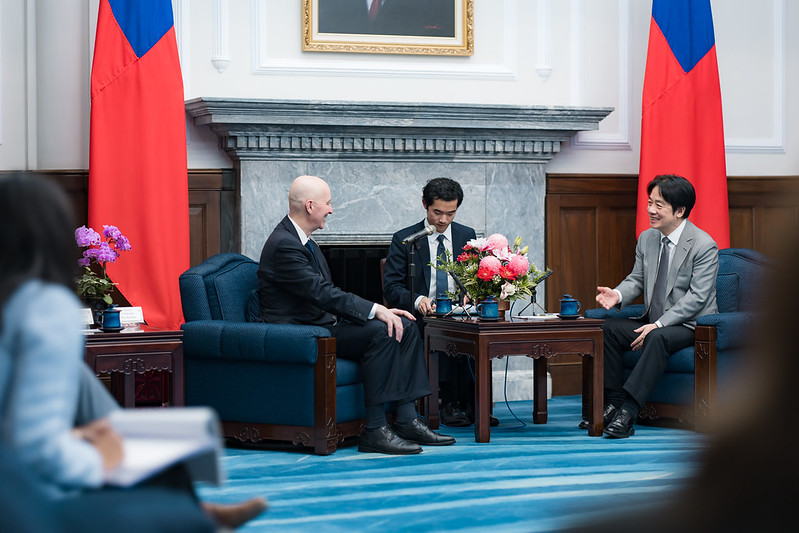
Gordon Chang in an interview with JAPAN Forward
In April, US President Donald Trump announced sweeping, across-the-board tariffs targeting friends and foes.
While reciprocal tariffs were temporarily suspended for most countries — China being the key exception — a baseline 10% levy on all US imports and auto tariffs remains in place.
With a single stroke, Washington sent markets reeling and global policymakers scrambling to assess the fallout. Stocks rebounded, but the core of Trump's strategy remains clear: to curb China's ascent.
Can his hardcore approach succeed? And what consequences might it carry for America's adversaries and allies in the far east?

In an interview with JAPAN Forward, best-selling author and conservative pundit Gordon Chang weighs in on the situation. Chang has written 12 books, most recently Plan Red: China's Project to Destroy America.
Trump Tariff and Its Impacts
Will Trump tariffs succeed in containing China?
I'm sure President Trump would like to reach a deal with China that puts an end to its predatory and criminal trade practices. Unfortunately, I don't believe that's possible. Beijing simply isn't in a position to change these practices, as they are deeply embedded in the Communist Party's system.
What Trump is trying to do is strike deals with Japan, South Korea, the European Union, Vietnam, and other countries, and then eventually try to stitch together a deal with China. By then, according to the plan, China would be isolated. But I'm not so sure Beijing will cooperate with that plan. I see a lot of turbulence ahead.
Is Trump open to a deal with Japan and South Korea?
I think that's the whole idea — that the United States will reach agreements with Tokyo, Seoul, and Brussels. The point is that President Trump isn't seeking trade wars. What he wants are better terms from our trading partners. So the overall strategy is to arrive at negotiated solutions with these capitals.

Some say Trump is pursuing a 'reverse Nixon' strategy, pulling Russia away from China. Will it succeed?
The chances of a reverse Nixon succeeding are very, very low. Russia and China are on the same page because Vladimir Putin and Xi Jinping see the world through the same terms. They believe their interests are aligned and share a common enemy: the United States.
I just don't see this working, especially given how abhorrent Russia's actions have been. Vladimir Putin is presenting himself as a monster, and I don't see how anyone can forge an enduring relationship with someone like that.
Could Trump's hardline policies end up binding Japan and South Korea with China?
Anything is possible — and China would like to see something like that happen. There have indeed been talks among the three capitals in recent weeks. But we have to remember that China is actively trying to divide South Korea, and it's doing the same with Japan. I also don't see how Tokyo and Seoul can separate territorial disputes from trade issues.

East Asia in Crisis Mode
Will Washington's containment policy cause Beijing to take escalatory action against Taiwan?
In recent weeks, we've seen provocative Chinese military exercises aimed at South Korea, Japan, Taiwan, the Philippines, and even Australia. It's a clear sign that something is deeply wrong within China's political system.
Trump's tariffs come at a particularly bad moment for Beijing. The Chinese economy may already be contracting. Its debt crisis is hitting them, the property market is collapsing. And now, Trump is piling on with tariffs.
Xi Jinping likely believes he cannot manage all these crises at once. He may, therefore, see causing conflict as his only way out, whether in Taiwan or elsewhere. The bottom line is, China's regime is dangerously unstable right now.
How credible is the idea that China could invade Taiwan by 2027?
I have never put much stock in any one particular date. We have to be prepared for anything, anytime, anywhere. The Chinese regime can take us by surprise now that Xi Jinping has made Beijing even more opaque.
We see signs of instability, which means that they can do anything. So, yes, it could be 2027, 2026, or even 2025. The point is, we need to be prepared.

South Korea holds a snap presidential election on June 3, with left-wing Lee Jae-myung leading the polls. Should Washington be worried?
I think everyone in the world should be worried about Lee Jae-myung, most of all South Korea. From everything we've seen, he wants to take South Korea down a path of merger with North Korea. He's aligning closer to Pyongyang and Beijing, and is a hardline socialist. Ruthless, too.
Moon Jae In, the former president, held similar views, but he didn't have the same level of determination. That makes Lee far more dangerous. Japan should be concerned because South Korean leftists have historically riled up its population against Japan.
Washington should be concerned because a leftist administration would draw Seoul closer to China and North Korea. If South Korea were to fall under a pro-communist regime, it would have a very disadvantageous effect on President Trump's policies, as it would have such a disadvantageous effect on everyone in the region.
RELATED:
- US-China Trade War: Mutual Misjudgments Trigger Early Showdown
- Tokyo's US Debt Weapon: Use at Your Own Risk
- Why the Rise of Lee Jae-myung Is Unnerving Tokyo and Washington
Author: Kenji Yoshida, Jason Morgan







